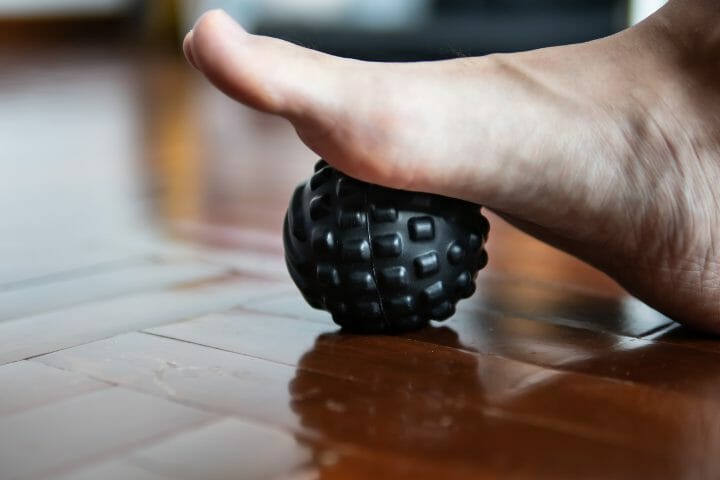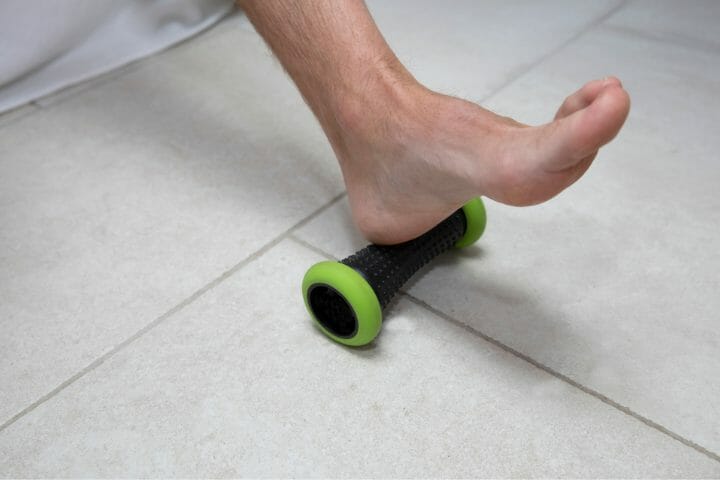Plantar fasciitis causes a horrible pain in your feet, to the point of you not being able to walk. Will losing weight help Plantar fasciitis patients? How can you lose weight if you can’t walk? What are the other ways to help reduce the pain? Read on to find out the answer!
Contents
As per data from the National Library of Medicine, Plantar Fasciitis is one of the most common causes of heel pain. It has been estimated to affect about two million people in the United States alone.
The South Sound Foot and Ankle podiatric clinic suggest that if one has a Body Mass Index of 30 or more, your risk of developing Plantar Fasciitis is approximately six times greater than a person with normal weight.

In this article, we will discuss Plantar Fasciitis and explaining how losing those few extra pounds might be the key behind reducing the everyday pain that you experience when you get out of bed in the morning..
But before you read ahead, keep in mind that individuals health and body mass are specific to them, and your best bet for healing plantar fascitis may be to talk to a qualified podiatrist.
Does Weight Loss Improve Plantar Fasciitis?
Are my feet hurting because of my weight? Research conducted by La Trobe University on the association between Body Mass Index and musculoskeletal foot disorders studied individuals over the 18 age group and documented their BMI.
The study showed that increased Body Mass Index is linked to non-specific foot pain and chronic plantar heel pain in non-athletics. However, there is currently little data to support weight loss to relieve foot pain.

Will losing weight get rid of Plantar Fasciitis?
The Department of Plastic Surgery of the University of Pittsburgh lists down a list of common treatments for Plantar Fasciitis, the first one being weight loss.
Family Pharmacy writes that obesity not only adds stress to a person’s fascia or heel but is also the major culprit in Plantar Fasciitis. Obesity puts much strain on the legs and can cause this painful condition.
You might also like to read: Can Plantar Fasciitis Cause Hip Pain? 6 Best Exercises For Patients With Plantar Fascitis
Can Weight Gain Cause Plantar Fasciitis?
One must understand that plantar Fasciitis does not develop overnight in people with more pounds, but more and more weight brings greater and greater strain to the lower extremities such as your toes and heel.
So if someone has put on weight fairly recently, they are at less risk of developing this condition, than someone who has always been on the heavy side of the weighing scale.
Cincinnati Foot and Ankle Care mentions that even a modest weight loss can tremendously reduce the strain and pressure on the lower extremities. People who make conscious efforts to maintain their weight can alleviate foot pain and prevent more damage and symptoms.
The UC San Diego Health mentions that the plantar fascia and the leg muscles that support the heel and foot are stretched and strengthened when a patient exercises when one puts weight on their foot, such as when they stand, the tension or stress in the plantar fascia increases.
When you push off with your toes and ball of your foot, the tension increases. Both of these motions happen on a day to day basis including when a person is walking or running. The fascia tends to lose its elasticity and resilience with time and might get irritated by ordinary daily activities.
Although being overweight does not automatically predispose you to Plantar Fasciitis or other foot problems, it is critical to recognize your increased risk and take efforts to mitigate it. A healthy weight loss program and a few behavioral changes in your daily routine can help minimize your risk.

Best Exercise To Lose Weight With Plantar Fasciitis
Selecting an exercise to lose weight when you have plantars fasciitis can be daunting. After all, most normal exercises such as walking, running, aerobics and others require you to put a lot of stress on your feet as you work out. But with your feet and ankles burning up with pain, these exercises are out of the question.
Thankfully there are several full body low impact exercises such as water aerobics, swimming, rowing and spin cycling which will let you lose weight without putting any stress on your feet.
However, if you feel that your legs are losing out in the effort to save your feet from pain, you can always do stretches and other exercises such as yoga, which will get your legs in shape as well.
You might also like to read: Does A TENS Machine Help In Plantar Fasciitis And Your Best Options
What Is the Most Effective Treatment for Plantar Fasciitis?
Akin to every medical condition, diagnosis and medical history are extremely important for prescribing the best treatment option for each individual. Many treatment options are available today, but all of them deal with different extremities of the medical condition.
Locating the pain helps determine its cause. Imaging tests may be required to do this, because a heel pain may not always be Plantar Fasciitis. Other factors may be causing it, such as:
- Fat pad atrophy (gradual loss of the fat pad in the heel or ball of the feet),
- Stress fracture,
- Spur in the heel bone
- Nerve compression of the foot or back, and many others.
Heel spurs are frequently mistakenly assumed to be the source of heel pain. Problematic spurs requiring surgeries are rare.
Treatment options for Plantar Fasciitis listed by Hopkins Medicine include stretching and physical therapy, icing and medication, rest, activity modification and orthotics, shock wave therapy, gastrocnemius recession, and steroid injections.

1. Stretching
Stretching is known to be one of the best treatments for this condition. One can see a physical therapist who will help them repeat certain exercises several times each day. Not only with these exercises help one with Plantar Fasciitis, but they also strengthen the lower leg muscles and help stabilize the ankle.
2.Surgical Procedures
Gastrocnemius Recession is the surgery for Plantar Fasciitis. The same is rarely needed but is always an option. Patients with equinus contracture — tightness in the calf muscles and tendons that makes it difficult to keep a foot in a neutral position (a 90-degree angle to the leg) may benefit from this treatment. This option is considered when the condition is extreme and all prescribed medications and treatments have not shown desirable results.
3. Steroid Medication
When patients do not show relief even after a few months of exercise and stretching routine, healthcare experts recommend steroid injections. The Mayo Clinic mentions that multiple injection shots are unrecommended because they can weaken the Plantar Fascia and even cause it to rupture.
4. Icing
Pain and inflammation can be dealt with by icing on the sore spot multiple times daily. Doctors may also recommend non-steroidal anti-inflammatory medication.
5. Extracorporeal Shock Wave therapy
Mechanical high-energy sound waves are made to penetrate through the skin to the afflicted area in shockwave therapy.

6. Ultrasonic Tissue Repair
This procedure employs ultrasound imaging to guide a needle-like probe into the patient’s plantar fascia tissue. The needle-like probe tip then vibrates to break the damaged tissue and suction the same out rapidly.
7. Orthotics
In some cases, your healthcare provider may recommend custom-fitted arch supports that help distributes the pressure on the patient’s feet more evenly.
8. Special Devices
Wearing a splint that keeps the plantar fascia and Achilles tendon in a lengthened posture overnight to encourage stretching may be recommended by your physical therapist or health care provider.
Switching to new footwear with a special type of arch support may also be recommended. One can also apply athletic tape to your foot to support ligaments and muscles.
This brings us to an end. Plantar Fasciitis may worsen in situations where patients may experience difficulty walking or even standing. Symptoms may also persist or worsen so much so that the plantar fascia may get permanently injured over time.
Check for any unusual symptoms and check with your healthcare expert regularly. In some cases, healing could take longer than usual if you don’t get the right care and therapy.
You might also like to read: Best Foot Massager For Plantar Fasciitis
In the End
Did we satisfactorily answer your question: will losing weight help plantar Fasciitis you? Do let us know your thoughts about the same in the comments section.
Please consider sharing this information with acquaintances sailing in the same boat. Also, let us know if there are other topics that you wouldd like us to cover.
